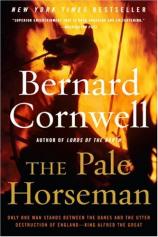The Pale Horseman
Review
The Pale Horseman
In THE LAST KINGDOM, his previous novel of ninth-century England,
Bernard Cornwell reminded us that "Viking" is in fact a verb and
not a proper noun. The people we now think of as Vikings were then
known as the "Danes," the same individuals who now populate Denmark
and Minnesota. Viking is not who they were, it was what they did
--- and what they did was wage war, wreak havoc, and generally make
hairy nuisances of themselves to the outside world. Going Viking
meant you were going for mead and plunder and battle and the blood
of enemies congealing in a pool at your feet. It was something we'd
now call a lifestyle choice.
The second book in Cornwell's ninth-century trilogy is THE PALE
HORSEMAN --- referring both to the deadly horseman of the Christian
apocalypse and a fictional Danish warrior, Svein of the White
Horse, who leads one of the invading forces into Saxon England. The
narrator is Uhtred of Bebbanburg, a displaced Saxon noble whose
Northumbrian holdings were overrun by the Danes and treacherous
relatives when he was young. In the first book he was captured by
the Danes and grew to be a fierce warrior in the shield wall. This
novel follows Uhtred dealing with his split loyalties --- both to
his pagan gods and Danish training, and to Arthur, King of the West
Saxons, who is trying to rid England of Danish influence and unify
the country under one crown.
In his heart, Uhtred would rather leave civilization behind. It has
brought him nothing --- a loveless marriage, a debt-ridden estate
in Devonshire, and the enmity of the Church and his fellow Saxons
(who nickname him "Uhtred the Wicked"). On the other hand, going
Viking can get Uhtred the silver he needs to pay off his debts and
the fame he needs to raise a battle host to storm the castle that
is his birthright.
If you think all of this sounds too crude and violent for your
taste, you are almost assuredly right. (The bit about the
congealing blood of the enemies probably gave it away.) You'd be
much closer to the mark, however, if you said that it all sounds
too formulaic --- that it's a typical tale of personal ambition set
against the backdrop of war and battles. The pattern and even the
plot twists will be familiar to everyone who's read Cornwell's
novels about the Napoleonic Wars or (for example) C.S. Forester's
Hornblower series.
However, two factors contribute to making THE PALE HORSEMAN
readable and enjoyable for those who aren't already fans of the
genre. First, Cornwell is a superb amateur historian and devotes
special care to making sure that his work reflects the history of
the time about which he writes. This is a special challenge for the
ninth century, given the paucity of contemporary sources and the
linguistic challenges of dealing with Middle English. (Cornwell
limits this, wisely, to place names and provides a handy
translation guide at the front of the book.)
Cornwell's scholarship is most evident in the character of Alfred
the Great, who the narrator Uhtred often treats as a creature of
contempt. Alfred is portrayed as an effective yet reluctant war
leader, but one whose judgment is often sacrificed to his faith.
Alfred's Christian piety leads him into superstition, and he is
occasionally manipulated by his bishops --- who tend to do things
such as assume that God will drop fire on the heads of the invading
Danes. (The impious Uhtred gulls Alfred into approving one
particular stratagem by claiming it is based on the parting of the
Red Sea by Moses.) Cornwell's focus on Alfred's religion marks him
as a man of his time and anchors us in the ninth-century
mindset.
The other factor, thankfully, is that Cornwell's books are simply
fun. THE PALE HORSEMAN is a blood-soaked romp of swords, shields,
daggers, duels, pagan shadow queens, and all sorts of other treats
for the reader (not to mention that the descriptions of
ninth-century battles tend to drive out the dreary realities of
twenty-first century war). The Uhtred character is a little too
stolid to be compelling, but he's always in the thick of battle,
and Cornwell takes second place to no one in explaining both the
strategy and carnage of historic battlefields.
For those who like mixing their action and adventure with sound
historical research and scholarship, THE PALE HORSEMAN is as
welcome as a long draught of mead or a bag of silver coins. And if
you have enough of those Danish butter cookies left over from the
holidays to enjoy while you're reading, so much the better.
Reviewed by Curtis Edmonds, who writes the "Northbound" blog at http://www.txreviews.com/blog and is hard at work on his second novel. on January 14, 2011
The Pale Horseman
- Publication Date: January 1, 2007
- Genres: Fiction, Historical Fiction
- Paperback: 384 pages
- Publisher: HarperCollins
- ISBN-10: 0061144835
- ISBN-13: 9780061144837





